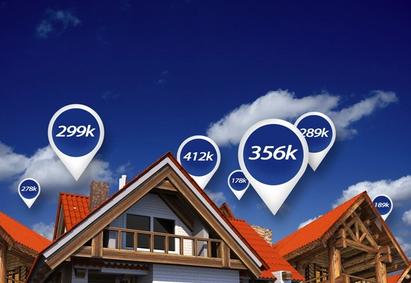Monthly Housing Expenses: The True Cost of Home Ownership
Written by:
Andrew Tavin
Andrew Tavin
Personal Finance Writer
Andrew Tavin a contributing writer for Own Up.
See full bio
Fact Checked by:
Dan Silva
Dan is the Vice President of Marketplace Lending at Own Up. Throughout his career, he has held executive leadership positions in the mortgage and banking industry.
See full bio

If you want to purchase a home, you'll either need hundreds of thousands of dollars on hand or you'll need a mortgage. Statistically, you'll probably have to go with the second option.
If you want to know what kind of housing finance you'll be able to afford, you'll first need to determine what monthly payments you can reasonably make. By calculating your current monthly costs you can determine if you have available income for housing expenses.
Determine Your Housing Expenses & Your Debt-to-Income Ratio
One factor that lenders will consider when you apply for a mortgage is your DTI, or debt-to-income ratio. You can calculate your own DTI, and it's a good idea to do so before you start looking for houses. That way you'll have a better sense of if you can qualify for a mortgage and what monthly housing expenditure you can tolerate.
Figuring out your debt-to-income ratio is relatively straightforward, though a calculator could be helpful.
First, you need to add up your monthly debt payment, including credit card payments, student loan payments, car payments and other regular monthly costs. Variable out-of-pocket expenses like groceries aren't traditionally included in the debt-to-income ratio, but it might be worth adding them to your personal ratio calculations to get the most accurate picture of your monthly expenses.
Now add up your monthly income before taxes. You can round down to the nearest dollar. Take the monthly debt payment and divide it by that income and you'll get a sense of what percent of your income for housing expenses remains.
In addition to monthly mortgage payments, this will also include homeowners insurance, mortgage insurance, and utilities.
How Do Lenders Use Your Debt-to-Income Ratio?
In addition to savings and credit score, the debt-to-income ratio is the one factor lenders use to determine if potential borrowers have the capacity to meet monthly debt obligations. To get a qualified mortgage through conventional financing, your DTI generally needs to be below 43%.
A lender who provides a qualified mortgage makes a good-faith effort to ensure the borrower can repay the loan before approving it. You might be able to get a mortgage with a DTI above 43%, but rates and terms may not be in line with your housing objectives.
While conventional loans may be out of reach, those backed by the Federal Housing Administration or Veterans Administration have looser qualifications. The trade-off, however, is stricter requirements around insurance and to what property the mortgage can be applied.
Approximate Your Rate
Once you have a sense of your finances, you can contact a mortgage lender for pre-approval to learn what real rates you can qualify for. You could also use Own Up's Rate Range Finder to calculate different potential monthly payments based on your financial situation, down payment, and mortgage length.
When comparing different rates, it's important to know whether you're looking at a real interest rate or a nominal rate.
Nominal rates do not take average inflation rates into account. A 5% nominal rate on a $100,000 conventional loan will mean $5,000 in interest payments over the life of the loan.
Real interest rates, on the other hand, incorporate average inflation rates. High inflation might mean paying more for household expenses, but it does mean lower real interest rates over the course of your loan.
Another important housing finance factor to keep in mind is fixed-rate versus flexible-rate mortgages. As the names suggest, the nominal rates for a flexible rate mortgage can be increased while fixed mortgages maintain a constant rate over the years.
Lenders and Your Housing Expense Ratio
Generally, responsible lenders want to ensure borrowers spend no more than 28% of their gross monthly income on housing expenditures, including mortgages and associated housing expenses.
These housing expenses fall into a few different categories, which your lender will often combine into one monthly mortgage payment.
Principal and Interest (P&I)
Principal and interest are the main components of your monthly mortgage payment. A principal is the amount borrowed that has to be paid back to the lender. Interest is what the lender charges for lending the borrower money. Conventional loans are amortizing, so you'll pay a portion of both principal and interest each month so the loan will be paid off on a set schedule.
Property Taxes
Property tax is based on the value of the subject property and is assessed by the local municipality. Most mortgage lenders will prorate your annual real estate taxes and add the cost to your monthly mortgage payment. This prevents the risk of a lien from the government that could preempt the lender's claim on the home.
Depending on where you live, you may be able to get a tax abatement for meeting certain requirements. Tax abatements reduce the taxes for a subject property for a temporary amount of time.
Homeowners Insurance
Homeowners insurance for owner-occupied properties protects against personal liability and physical property damages. It is also usually prorated and charged as part of the monthly mortgage payment, though you'll still need to remember to budget for personal insurance.
Mortgage Insurance
Unless a borrower is able to put down at least 20% upfront, most lenders will require they pay for private mortgage insurance, or PMI, each month. Borrowers with Federal Housing Administration loans must also pay for mortgage insurance as a loan condition.
Flood Insurance
If your property is located in a Special Flood Hazard Area you'll be required to pay flood insurance premiums. The lender will conduct a flood certification to determine whether the property is in a designated flood zone.
Homeowners' Association (HOA) Dues
A Homeowners' Association is an entity that supports the day-to-day operation and interests of certain residential dwelling communities, including condos and co-ops. HOA leadership is elected by the members and sets rules that all members must follow. HOA dues are paid monthly and used for community upkeep. Lenders will require the HOA to complete a questionnaire to finance an included property.
Don't Forget Household Expenses
While your lender may only consider direct housing costs when calculating your housing expense ratio, that doesn't include many of the actual expenses you'll face day to day.
It would be impossible to cover all the possible housing expenses, but there are many common costs worth budgeting for in advance.
Maintenance and Repairs
Unless you're living in an HOA community, you'll be responsible for covering your home maintenance or hiring people to do so. A good rule of thumb is to put aside at least 1% of your home's value, rounded up to the nearest dollar, each year for maintenance and repairs. Divide the total by twelve and you can set aside average amounts each month. You can use a tool like Homebinder to digitally manage your maintenance schedule and keep track of receipts.
Emergency Fund
Emergencies happen beyond your regular housing expenses. There could be a job loss, a medical issue, or a repair beyond the standard amounts you've been setting aside for maintenance.
An emergency fund is for any major surprise costs that weren't factored into your other expense calculations. Put aside a little of your income each month until you have a quarter to a year's worth of your regular operating expenses on hand.
Savings Fund(s)
Whether it's saving up for a vacation, a new car, or a kid's college fund, your housing expenses shouldn't be so high that they don't leave any room for future planning. You should also be considering retirement costs, especially if you don't have a 401(k) or IRA already set up.
Other Household Expenses
Coming out of the pandemic, there was a major spike in inflation between 2021 and 2023. While it has decelerated in Q4 2023, don’t make the mistake of under-budgeting for your expenses.
Since the cost of your out-of-pocket expenses could rise over the course of your loan, you should be careful that you won't be spending too much of your income on housing costs when looking at the monthly expense of a mortgage you're considering.
Some regular expense calculations to factor into your budget include:
- Groceries
- Home supplies
- Medical care
- Haircuts
- Personal insurance, including health insurance and life insurance premiums
- Utility bills
- Dining and entertainment
- Transportation expenses (public transportation fares and car insurance and maintenance)
- Childcare or daycare
- School supplies
You can track your "operating expenses" for a few months and use that as a basis for future spending and to determine your own housing expense ratio. It'll give you a better picture of if you can truly afford to spare the income on housing costs you'd need for a conventional loan mortgage.
There are many different apps to plan for household expenses and get a sense of your budget. U.S. News and World Report reviewed its nine favorite simple tools. As a bonus, they are all free.
So What Housing Choice is Right for You?
The housing choice that is right for you is a combination of your financial picture and your comfort level in terms of savings and housing expenses. It is often helpful to meet with a personal advisor to discuss your housing objectives and expense calculations.
Some people choose to wait a little longer to pursue housing finance and save more money for a larger down payment and lower nominal rates. A higher income could also mean a better housing expense ratio.
It's also worth comparing with market rents and the average house price in your area. The actual interest payments you make might be worth it since you'll be building equity with each mortgage payment. However you decide, be smart and make sure you’re ready for this major financial step.


